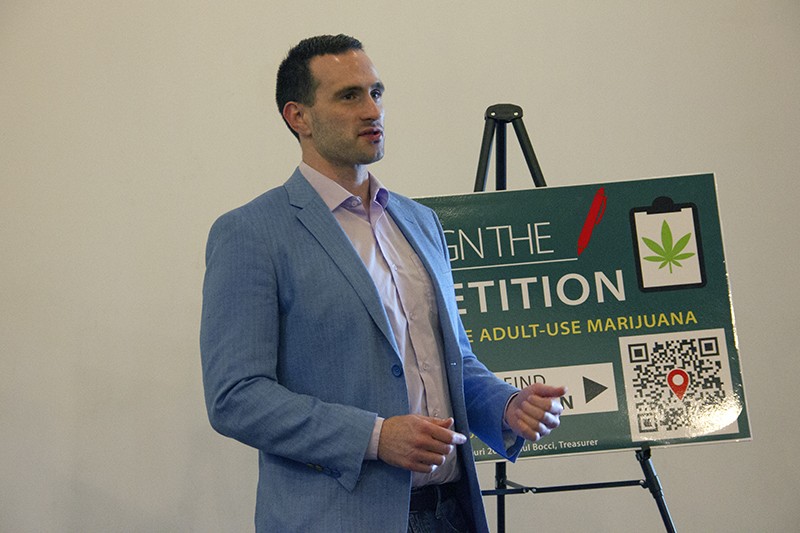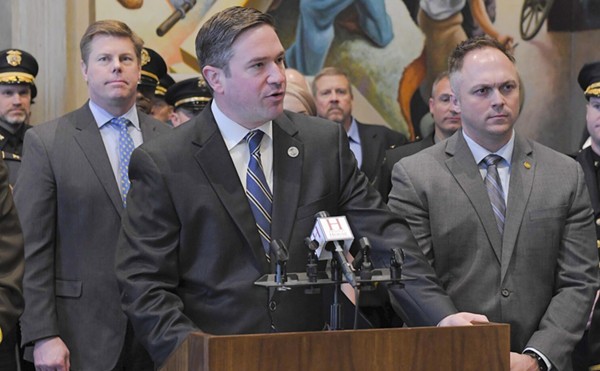
DANNY WICENTOWSKI
John Payne and Legal Missouri 2022 believe it's high time for adult use cannabis in the Show Me State.
For the fourth time since 2016, Missouri voters are gearing up to consider the future of legalized marijuana. While previous attempts at "adult use" legalization have faltered, 2022 is shaping up to be the best chance for activists and consumers hoping to finally see the measure cross the finish line.
One of those activists is John Payne. The campaign manager for Legal Missouri 2022, Payne served a similar role for New Approach Missouri during its failed 2016 campaign, which barely missed the required number of signatures to make the ballot. In 2018, Payne and the group came to successfully place the "Amendment 2" medical marijuana initiative on the ballot, which ultimately was approved by voters in a landslide.
However, the group's follow-up effort — to place a recreational cannabis measure on the 2020 ballot — was grounded by the pandemic.
That winding path has now led Payne and the Legal Missouri campaign to their latest endeavor, which includes new provisions for "automatic" expungement and a lottery system for awarding licenses.
"It is finally time for Missouri to legalize and regulate the adult use of marijuana," Payne said during a December 2 event that marked the official launch of the signature-collection campaign.
Even with Missouri's medical marijuana industry booming — retail sales have generated more than $186 million since October 2020 — Payne said that the status quo continues to "feed illicit markets and distracts law enforcement from more serious property and violent crimes."
It's an argument that Payne and other legalization proponents have made for years; during the press conference, Payne cited the 2018 success of the "Amendment 2" initiative as evidence that Missourians are ready to join nineteen other states in expanding legalization beyond medical needs.
But 2022 is not 2018. For one thing, Payne and other members of the 2018 campaign have spent the last three years or so raising their statuses as consultants in the medical cannabis field, becoming the face of the industry's establishment. Meanwhile, the state's cannabis licensing and regulation system has itself has been the subject of lawsuits and controversy over its application scoring system. There's also been steady criticism over the lack of minority participation and the apparent glut of wealthy license holders representing "vertically integrated" companies with out-of-state ownership.
In an interview after the press conference, Payne conceded that critics of Missouri's cannabis licensing system have legitimate grounds, noting, "I'm not going to stand here and say everything has gone absolutely perfectly." Still, he pointed to the fact that more than 160,000 Missourians have obtained their cannabis prescriptions as evidence the system is working — and, crucially for the upcoming campaign, that its popularity only seems to be increasing.
"The proof," Payne added, "is in the pudding."
There are several components of Missouri's existing medical cannabis system that would change under the Legal Missouri proposal. Medical dispensaries will be allowed to convert to adult use facilities, and a new category of licenses would no longer be judged solely on a "points" system.
Among other items, Legal Missouri's adult use cannabis initiative would establish:
- A sales tax of six percent on recreational/adult use marijuana, with localities allowed to add their own sales tax of three percent. (Medical patients would continue to be taxed at four percent.)
- An "automatic" expungement system covering people convicted of nonviolent marijuana crimes, with exceptions for those convicted of distribution to minor, using marijuana while driving, or any crime involving violence. The proposed system would also vacate the sentences of all eligible defendants currently incarcerated in jails and prisons.
- A ban on employment discrimination based on a person's status as a marijuana patient or a positive drug test, with exceptions for instances of work impairment or if marijuana use "affects in any manner a person's ability to perform job-related responsibilities."
- A new category for "microbusiness" licenses only available to applicants with at least one qualifying condition, including: having a net worth below $250,000; having a military-connected disability; residing in a zip code with 30 percent population below the poverty level; having been arrested or prosecuted for a non-violent marijuana offense; and graduating from an unaccredited school district.
- An appointed "chief equity officer" who would be responsible for assisting the rollout of the micro business license program and providing "targeted technical assistance" to applicants from communities impacted by historic marijuana criminalization.
There's also the matter of a second adult use cannabis initiative, called Fair Access Missouri, which is now collecting signatures for its own version of full cannabis legalization. If Fair Access succeeds in making it on the ballot, the result would be a similar setup to 2018, which featured a confusing array of competing cannabis proposals on the ballot.
On its website, Fair Access describes itself as "a grassroots coalition of activists, patient advocates and entrepreneurs" who are committed to an open market, low taxes and low barriers for entry. The group's mission statement asserts: "Missouri can't afford to expand the entrenched monopoly and reward the bureaucrats who mismanaged implementation of the medical market by letting them continue to regulate a new adult-use market."
However, Fair Access has a difficult path ahead, as it will likely take hundreds of thousands of dollars, even millions, to collect enough signatures for the ballot. So far, according to the most recent filings with the Missouri Ethics Commission, Fair Access has spent less than $100,000 on its cannabis campaign.
Legal Missouri has already spent around $280,000.
Follow Danny Wicentowski on Twitter at @D_Towski. E-mail the author at [email protected]





